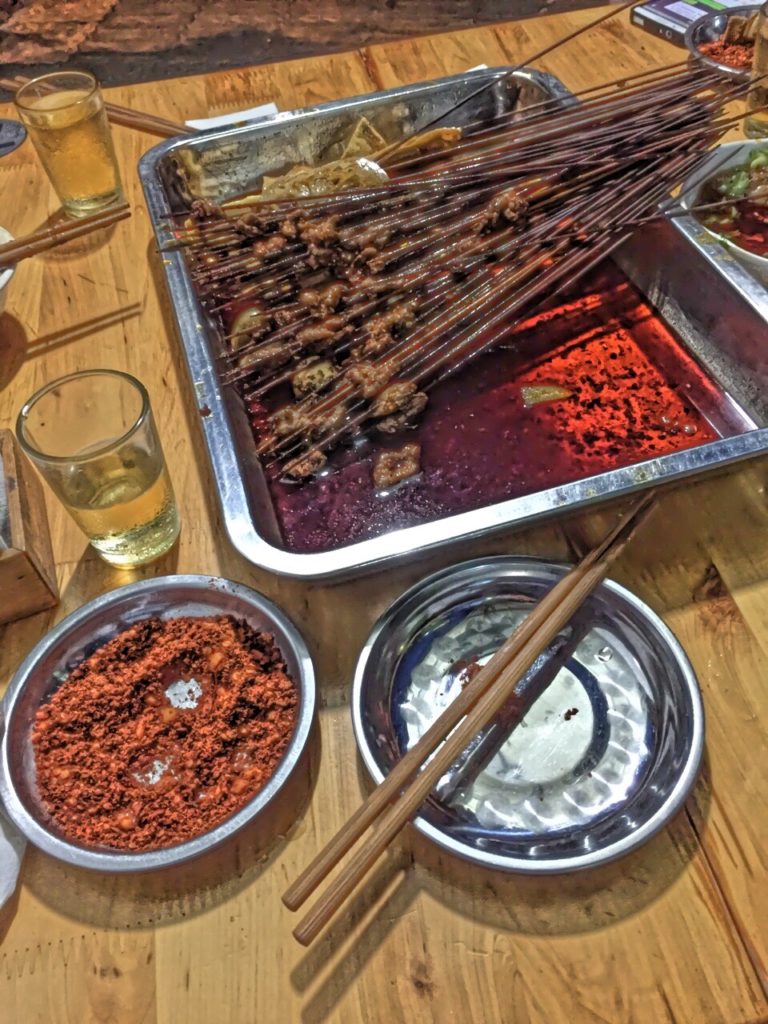
Within the last few years, an industry has sprung up aimed at people who don’t know how to cook but yearn to do so. The basic model of such companies is that they deliver kits for making a homemade meal: the ingredients, with any pre-work like peeling or trimming already done, and a set of instructions that includes step by step photographs pretty enough to be in a food magazine.
I tried one of these services a year or two ago, lured by a good coupon deal, and did get some value out of it, but cancelled the subscription before they could start hitting me with the non-coupon costs. For someone utterly foreign to the idea of cooking, these might be useful to show how easy it is to create a tasty meal, or for someone scared of failure, they might build confidence. But the amount of wasteful packaging was striking, and that seems a bad thing to me. I don’t like creating garbage, because among other things, it means I must expend effort taking it out, but also because it’s bad for the planet.
The average American generates 4.3 pounds of garbage per day. That’s over a pound and a half over what the figure was in 1960. So we’ve gotten, overall, less efficient rather than more, while at the same time depending on resources that are diminishing.
Every one of the kits came in cardboard packaging around a styrofoam box with two large ice packs. I stuck a few of those ice packs away for re-use but there are only so many ice packs any household can use and they’re not recyclable because they’re filled with some sort of chemical solution. Every ingredient was packaged separately, down to tiny plastic bottles holding approximately a teaspoon of soy sauce. If I had weighed the garbage against the end result, I would have found the garbage far in excess of the end result.
I think people should know how to cook, because it’s a skill that helps them make their life better in a number of ways. I freely acknowledge that people with few resources will have a harder time cooking, yet be in a position where the practice would benefit them tremendously. Some low-cost appliances can be of much use here, like a rice cooker, hot plate, or toaster oven, but using those efficiently takes skill and knowledge. These kits aren’t going to teach people some important basics, such as how to shop economically/efficiently, how to store ingredients, or how to prepare food.
My grade school taught home economics in 6th grade, in a time benighted enough that girls weren’t allowed to take shop class, because that teacher claimed he was too worried about long hair getting caught in machinery. It was useful stuff: how to plan and cook a meal and how to sew things, mainly. We did have a few boys in there, mainly ones who were there for eating part of cooking practice.
Most of what I learned about the kitchen, though, I learned at home, from my mother, who was and continues to be a skilled and adventurous cook, my maternal grandmother, who provided farmhand meals for decades and was a master cake decorator, and my paternal grandmother, who had only a few dishes down, but made them well.
It wasn’t until graduate school, though, that I realized that I really loved to cook and was pretty good at it, particularly after two years of catering to a household that included two vegetarians, a lactose-intolerant, someone testing for food allergies, and a follower of the Pritikin no-fat whatsoever diet. I hosted dinners and potlucks, fed a houseful of boarders, and created a backyard garden that supplied fresh ingredients. I learned to love tiny ethnic grocery stores as well as how to make some of my own staples, began to bake bread on a regular basis, and began to accumulate what’s currently two shelves of cookbooks (and books about cooking), despite frequent culling.

Why do I think the skill is so important? Here’s what it has brought to my life over the years.
- Economic advantages: I can live significantly more cheaply than someone who eats out or buys pre-prepared food. I could feed my household for significantly less than I would otherwise if I’m willing to put a little time into planning my meal schedule and shopping. Among the things I can and often do make at home that are cheaper: yogurt, bread, pasta, salsa, mayonnaise, hummus, cookies, soup stock, kombucha, burritos, ricotta cheese, cold-brewed coffee, instant oatmeal, flavored butter, ice cream — and that’s just the foodstuffs. I can stretch meals – buy something that serves for multiple meals, like a pork shoulder that goes into pulled pork, stir-fry, and then soup. Learning how to cook well can be the single biggest budget-changer skill a person learns.
- Nutritional advantages: I know what’s going into my food and can accommodate my partner’s sensitivity to corn, for one. Looking at the list of ingredients of something like Hamburger Helper, I see a bewildering array of chemicals. Some are everyday things dressed up in scientific names, but a lot are chemicals designed to keep the food lasting longer on a store shelf or to make it pretty. I can incorporate foods that I know are good for us or cut down on things like sugar, sodium, and fat.
- Educational advantages: Learning how to cook means learning how to plan and prepare. When I give a dinner party, I’ve got a schedule laid out ahead of time: this dish goes into the oven at time x, then I prep onions for the next dish while the water’s boiling for yet another. It means a bit of math if you want to play around with servings and substitutions. It can mean even more education: learning the cuisine of a particularly country often involves learning something about its history and culture. You also learn how a small addition can have a major impact, how to taste as you go, and other useful stratagems.
- Social advantages: In grad school I hosted countless potlucks, which were a cheap way for impoverished grad students to come together for a meal, as well as various cook-offs, including a chili competition that featured, if I’m remembering correctly, eight different kinds. Yesterday I hosted my D&D group, feeding them an epic lunch of Mongolian hotpot before we started gaming. I can also throw a party much more cheaply than the cost of hiring someone to cater it. Moreover, through judicious application of delicious food and drink, I can delight my friends and enjoy their company and conversation for a period of time. When I was dating, I showed off my cooking skills more than once in order to woo someone. There’s something about having someone prepare food to you that is deeply romantic. Not to mention the seductive shazam of an intimate meal shared in the right setting. Even now, I can demonstrate affection for my spouse by fixing him breakfast in bed or his favorite snack when he’s feeling beleaguered by the world.
- Aesthetic advantages: Food is one of life’s great pleasures. Celebrating its flavors and complexities is an aesthetic pursuit, and learning to appreciate new foods is an opening up to new things that helps make life more enjoyable. If you understand food and some of its complexities, you can appreciate that elaborate dessert or delicately flavored cheese even better. And a writer can rarely go wrong by exploring the sensory, in my opinion.
- Ecological advantages: Learn how to cook and you eliminate a lot of waste. Plus you learn how to use up some of what would be otherwise thrown away. Vegetable and meat trimmings can be saved to make awesome soup stock; those excess bananas so quickly turning brown can become an ice cream substitute. I made soup stock from chicken feet yesterday; the result was a healthy broth for my sick spouse that cheered him up, but also reminded me that living creatures went into our meal. Eating meatless (which has its economic pluses as well) is much easier if you know how to cook things like lentils, beans, and grains. Learning how to ferment foods has made me more aware of how much we depend on the microbial world in cooking.

How does one acquire the skill? DIY kitchen kits are not the way to go. Pick a simple dish: scrambled eggs, a grilled cheese sandwich, a basic soup. Start smaller if you’re totally new and learn how to hard-boil an egg. That’s a useful skill, because not only have you learned how to make pre-packaged protein-rich snacks that you can take with you to work, but you’ve learned a basic ingredient for recipes ranging from egg salad to eggs Vindaloo.
Or pick a basic appliance and start experimenting. A rice cooker is one of the most versatile things you can own; throw a handful of lentils and some spices in with your rice and you’ve got a cheap, one-pot meal, for example. A toaster oven performs a multitude of tasks, and a slow cooker has many of the uses a rice cooker does.
One of the great things about the Internet is that it throws up so much of this stuff online. When I started making my own tamales, I went to Youtube to watch techniques and learned by seeing the demonstration in a way I would have never absorbed from a textual recipe. It was a bit of a challenge, which learning new things should be (IMO) in order for them to really sink in. Opening a package and putting preassembled bits together doesn’t give you the knowledge you need in order to assemble those things on your own.
Like so many things in life. Right now we’re at a time when plenty of people are ready to provide you with pre-assembled mindsets, lists of talking points, ingredients measured and tailored so they can be assembled only into a single recipe. Question your mental ingredients, know where they come from, and taste as you go.
And remember the universe loves you (along with everybody else).
Peace, out.
#sfwapro










12 Responses
Nattering Social Justice Cook: DIY Cooking Kits: https://t.co/AVnvjnoCKF
I just started one of these (Home Chef) recently and have quickly come to love it. It’s not that I don’t know how to cook or can’t, it’s that I wasn’t. Coming up with new meals that both of us would eat, buying the ingredients, and then actually cooking wasn’t something I was doing. Now I’m getting all of the ingredients (without having to go to the store, one of my least favorite chores) – and in the case of this company they are not prepped, I still have to do that – and I’m not ending up with a bunch of leftover ingredients that I don’t know what to do with. Or a bunch of leftovers we just end up throwing out anyway. So not only has it increased how often we eat at home, which both saves us money and calories, but it makes me feel like a competent cook again and gives me recipes I can use again in the future if I do decide to buy my own ingredients. The perfect built-in portion control is really good for us too, since we are both classic over-eaters.
The packaging though. Ugh. The good news, with Home Chef it’s all recyclable. The bad news is there’s still way too much. It was also suggested to me that if you don’t want to recycle the ice packs to donate them to organizations such as homeless shelters, soup kitchens, or meals on wheels type programs. The perfect square and super sturdy boxes are also good for moving if you have friends who are doing that soon.
We’ll see at the end of the first month whether or not I decide to keep going with it.
Mollie Wogg liked this on Facebook.
Randy Rambo liked this on Facebook.
I did the same with BA a few years back. The cold packs alone made me queasy; the idea of throwing those things away week after week…
Most of them are 100% recyclable now. You cut them open and wash the gel down the drain and then recycle the plastic. Or, when I made the complaint to a friend of mine, she suggested donating them to places that might have use for them: homeless shelters, soup kitchens, meals-on-wheels type programs. I’ve found the majority of orgs I’ve talked to are happy to take them, but I’m sure that depends on the orgs in your area.
Emily French liked this on Facebook.
Karen Heuler liked this on Facebook.
Brianne Sorendo liked this on Facebook.
Danielle Myers Gembala liked this on Facebook.
Bishop O’Connell liked this on Facebook.